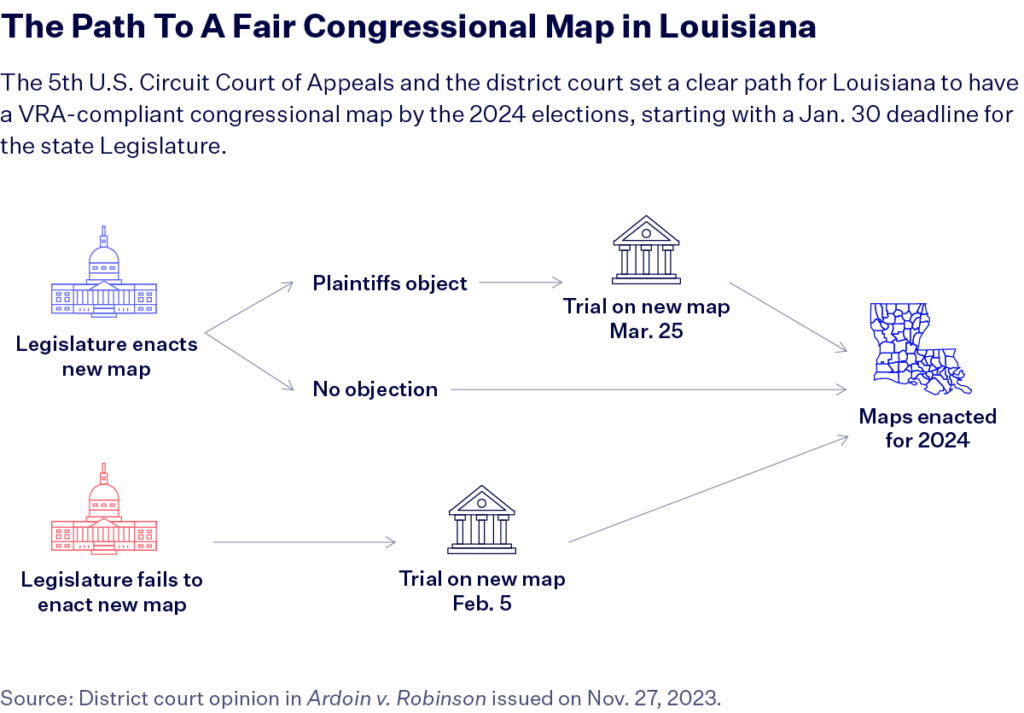Louisiana Republicans Ask 5th Circuit To Rehear Critical Voting Rights Act Case
WASHINGTON, D.C. — On Friday, Louisiana Republicans asked the 5th U.S. Circuit Court of Appeals to rehear a case with major implications for redistricting and the future of the Voting Rights Act.

Republican officials asked the entire 5th Circuit — as opposed to the typical three-judge panel — to rehear a lawsuit challenging Louisiana’s congressional map. Specifically, Republicans are challenging part of a November ruling affirming the ability of private parties (civil right groups, individual voters, etc) to bring lawsuits under Section 2 of the Voting Rights Act (VRA). In legal terms, this concept is known as a private right of action.
This action is the latest in Ardoin v. Robinson, a lawsuit filed on behalf of Black voters challenging Louisiana’s congressional map for diluting the voting strength of Black voters under Section 2 of the VRA.
This case was one of the first cases to move after the U.S. Supreme Court’s decision in Allen v. Milligan.
In June 2022, a federal district court blocked Louisiana’s map for likely diluting the voting strength of Black Louisianans in violation of Section 2 of the VRA and ordered the state to adopt a new map with a second majority-Black district. Republican officials appealed this decision to the Supreme Court and requested emergency relief, arguing that the Louisiana case “presents the same question as” the case challenging Alabama’s congressional map, Allen v. Milligan. The Court granted the Republicans’ requested relief and paused the decision blocking Louisiana’s map while also holding the case pending the outcome of Allen.
On June 8, 2023 the U.S. Supreme Court issued a 5-4 decision in Allen v. Milligan that left Section 2 of the Voting Rights Act intact and immediately had reverberating effects for redistricting cases across the country. Soon after this landmark ruling, the Louisiana case began to move as well.
After the Supreme Court’s decision in Allen, the Court handed down an order in Louisiana’s congressional redistricting case.
After Allen, the U.S. Supreme Court reinstated an order that blocked Louisiana’s congressional map for diluting the voting strength of Black voters, paving the way for Louisiana to redraw its congressional map with a second majority-Black district. The case went back to the 5th Circuit for further consideration.
In late September, two ultra-conservative judges on the 5th Circuit canceled a hearing that was supposed to cover a new congressional map that would comply with the Voting Rights Act. After the canceled hearing, the 5th Circuit finally set a new timeline for Louisiana’s congressional map.
Importantly, in the same opinion as the new timeline, the panel rebuffed one of Louisiana Republicans’ more fringe arguments: that private groups and individuals cannot sue under Section 2 of the VRA.
“We conclude that the Plaintiffs here are aggrieved persons…and that there is a right for these Plaintiffs to bring these claims,” the opinion reads.
The November order from the 5th Circuit gave the Louisiana Legislature a Jan. 15 deadline to enact a new congressional map and sent the case back to the trial court for a trial to take place before the 2024 elections. The district court gave the Legislature — which suggested that it cannot draw a new map in time — an extension.

The Legislature now has until Jan. 30 to enact a new map or inform the court that it will not be enacting a new map. At that point, there are three distinct paths forward:
- If the Legislature does not pass a new map, there will be a trial on the existing map on Feb. 5 in the district court.
- If the Legislature does pass a new map and the plaintiffs in the lawsuit do not object to the map, that map will be enacted for 2024.
- If the Legislature passes a map that the plaintiffs object to, there will be a trial on March 25 to determine if the map can be used for 2024.
As with all things redistricting this cycle, the Legislature’s willingness to pass a new congressional map with a second majority-Black district is not the only contingency impacting Louisiana’s path toward a fair congressional map.
The 8th Circuit issued a catastrophic ruling, prompting Louisiana Republicans to ask for rehearing in the 5th Circuit.
On Nov. 20, the 8th U.S. Circuit Court of Appeals held that private litigants can no longer bring lawsuits under Section 2 of the VRA. Crucially, this ruling only applies to seven states in the 8th Circuit: Arkansas, Iowa, Minnesota, Missouri, Nebraska, North Dakota and South Dakota.
As a result, Louisiana Republicans asked the entire 5th Circuit to rehear its Nov. 10 opinion that, unlike the 8th Circuit, held that private parties can bring lawsuits under Section 2 of the VRA in the three states covered by the 5th Circuit: Louisiana, Mississippi and Texas.
In their petition for rehearing, Louisiana Republicans argue that the conflicting opinions in the 5th and 8th Circuits should require the 5th Circuit to reconsider its precedent as well: “ The result of the circuit split is an untenable scenario where a VRA claim by private litigatns [sic] can proceed in Louisiana but not in neighboring Arkansas.”
If the entire 5th Circuit agrees to rehear the case, the prior ruling will be voided unless the court explicitly states that it should not be, according to the court’s rules. If the 5th Circuit reconsiders its prior Section 2 precedent, this could gravely curtail the ability of voters to challenge discriminatory maps under the already weakened Voting Rights Act.
Louisianans voted under a likely illegal map in 2022. This year, it is clear that there is a path forward for a fair map for 2024. Unfortunately, the road in the Bayou State has been a rocky one and there are still a few obstacles on the horizon.
If the 5th Circuit were to take the drastic measures taken by the 8th Circuit, voters across 10 states would have little recourse to fight unfair and discriminatory maps under the Voting Rights Act.